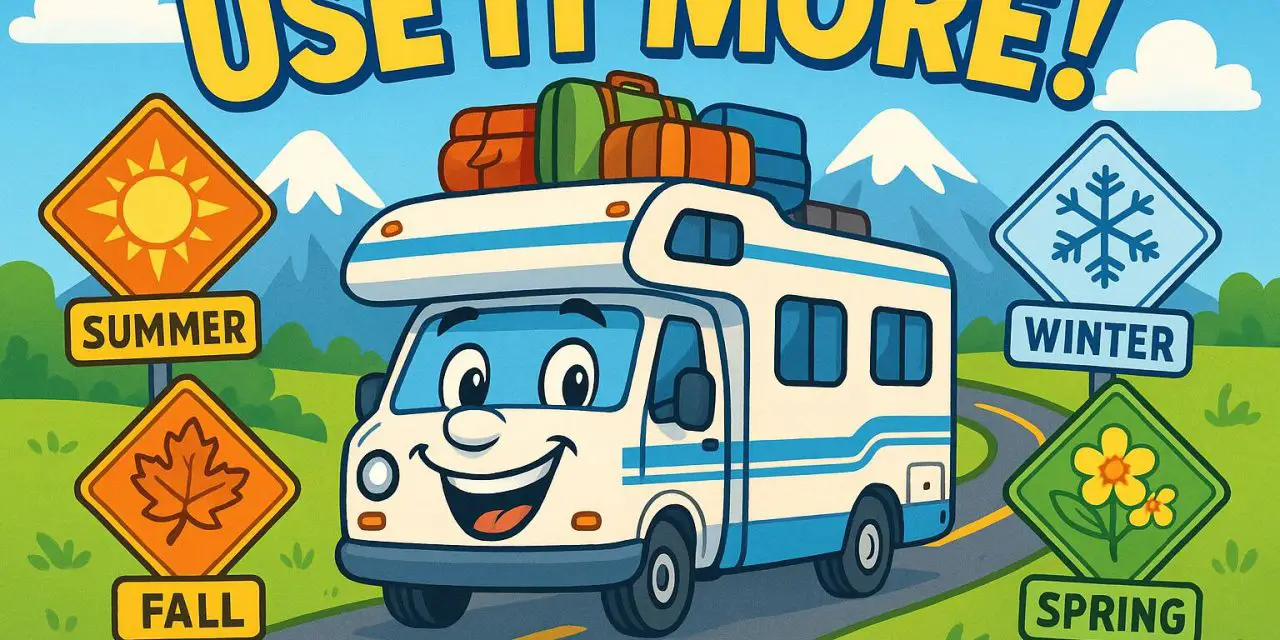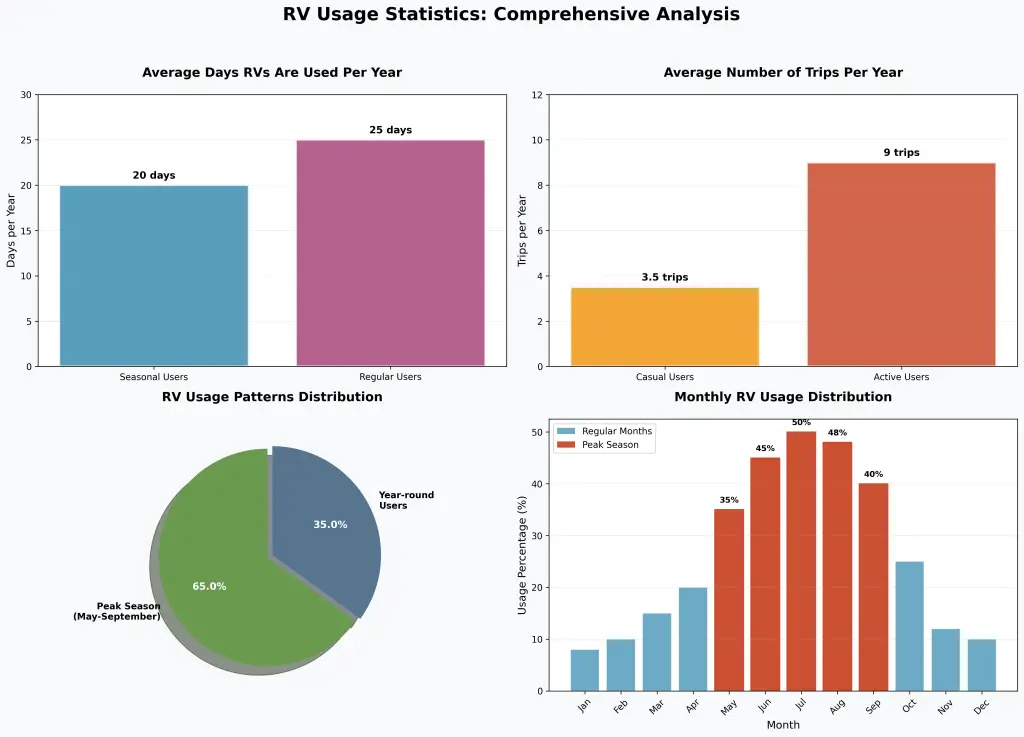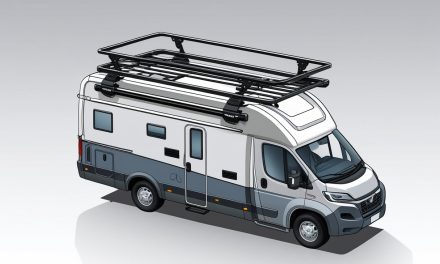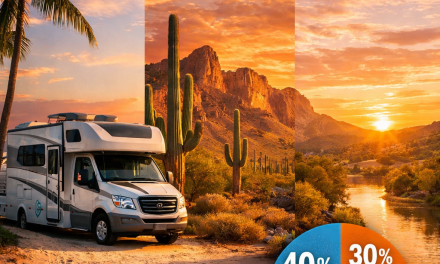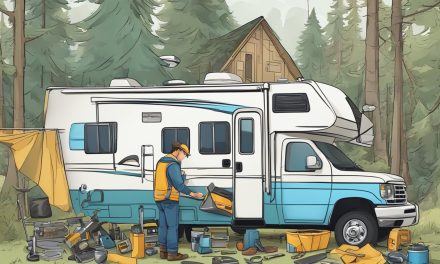If you’re like most RV owners, your home-on-wheels spends more time parked than exploring the open road. Here’s a shocking reality check: the average RV owner only uses their rig about 20-25 days per year! That’s less than 7% of the year for what’s likely one of your biggest investments. But what if we told you that breaking this pattern could revolutionize your RV experience, save you thousands of dollars, and dramatically improve your mental health? In this eye-opening guide, we’ll explore seven compelling reasons why you should fire up that engine more often and hit the road throughout the year. From avoiding costly repairs to discovering hidden gems in off-season destinations, you’re about to learn why the most successful RVers are the ones who embrace year-round adventures. Get ready to transform from a seasonal weekend warrior into a confident, year-round road warrior!
Would you like to save this article?
1. It’s Perfect Practice for Your RV Skills
Here’s the deal: Using your RV regularly is like going to the gym for your camping skills. The more you practice, the stronger you become as an RVer. According to industry statistics, regular RV users take an average of 9 trips per year compared to casual users who only manage 3-4 trips annually.
The Numbers Don’t Lie:
- Weekend warriors who store their RVs for months forget crucial operational details
- 78% of RV problems occur after extended storage periods
- Regular users report 40% fewer operational issues compared to seasonal users
Why This Matters: Every system in your RV needs regular attention. Your water heater, leveling system, slide-outs, and electrical components all function better with consistent use. When you’re constantly practicing setup and breakdown procedures, you become fluent in your RV’s quirks and capabilities.
Real Talk: If you only camp twice a year, you’re basically a beginner every single time. You’ll spend the first day of every trip relearning what that weird beeping sound means or why your slide-out is acting up. Regular users, on the other hand, can troubleshoot issues like pros because they’ve encountered (and solved) these problems multiple times.
2. Your RV Systems Get Regular Testing and Maintenance
The Reality Check: Your RV is essentially a house on wheels with complex systems that need regular exercise. Think of it like a car – leaving it parked for months creates more problems than driving it regularly.
Critical Systems That Need Regular Testing:
- Generator: Should run for at least 2 hours monthly under load
- Water heater: Needs regular cycling to prevent mineral buildup
- Slide-outs: Seals dry out and mechanisms seize without regular movement
- Leveling systems: Hydraulic systems need regular operation
- Solar/electrical: Batteries and charge controllers need monitoring
Industry Statistics:
- RV service rates average $120-180 per hour
- Regular maintenance can prevent 85% of major system failures
- Properly maintained RVs retain 10-15% more value over five years
The Bottom Line: Regular use forces you to stay on top of maintenance rather than discovering multiple problems during your pre-season shakedown. You’ll catch small issues before they become expensive disasters.
3. Motion Keeps Everything Lubricated and Functioning
The Science Behind It: RVs are designed to move. When they sit stationary for extended periods, rubber components dry out, seals crack, and mechanical parts seize up. Movement keeps fluids circulating, prevents corrosion, and maintains proper operation of all moving parts.
What Happens During Extended Storage:
- Tires develop flat spots and sidewall cracking
- Brake rotors can warp or develop rust
- Engine oil settles and loses effectiveness
- Transmission fluid becomes stagnant
- Rubber door and window seals deteriorate
The Maintenance Cost Reality:
- Annual RV maintenance costs average $1,200-$3,000
- Storage-related repairs can add $2,000-$5,000 annually
- Regular use reduces total maintenance costs by up to 30%
Here’s the Kicker: The RVs that spend the most time in storage often need the most expensive repairs. It’s like that old saying – use it or lose it! Your RV wants to be on the road, not gathering dust in a storage lot.
4. Discover Places in Different Seasons and Weather
The Adventure Factor: Year-round RVing opens up a completely different world of experiences. That crowded campground in July? It’s a peaceful paradise in March. That “closed for winter” destination? It might be offering special rates and uncrowded access.
Peak Season vs. Off-Season Benefits:
- Summer: Full facilities but crowded, expensive
- Fall: Beautiful foliage, cooler weather, fewer crowds
- Winter: Dramatically lower costs, unique experiences
- Spring: Mild weather, blooming landscapes, moderate crowds
Real Examples:
- Yellowstone in winter offers snow-coach tours and ice fishing
- Beach destinations in fall provide mild weather and empty beaches
- Desert areas become pleasant in winter months
- Mountain areas offer stunning fall colors and crisp air
The Experience Multiplier: You’re not just camping – you’re experiencing the full personality of each destination across all seasons. Most RVers only see the summer version of their favorite spots and miss out on 75% of what these places have to offer.
5. Experience Different Weather Conditions
Building Confidence: Regular use in various weather conditions builds your confidence and skills as an RVer. You’ll learn how your RV handles wind, rain, cold, and heat – knowledge that makes you a better, safer traveler.
Weather-Specific Skills You’ll Develop:
- Cold Weather: Proper winterization, heating efficiency, preventing frozen pipes
- Hot Weather: Cooling strategies, awning usage, power management
- Windy Conditions: Driving techniques, setup considerations, awning safety
- Rainy Weather: Leak detection, humidity control, indoor entertainment
Safety Statistics:
- 40% of RV accidents occur due to weather-related inexperience
- Drivers who practice in various conditions report 60% fewer incidents
- Emergency preparedness improves dramatically with regular use
The Confidence Game: When you’ve successfully camped in different weather conditions, you’re not afraid to take that trip when the forecast isn’t perfect. You know your RV’s capabilities and your own skills, making you a more adventurous and confident traveler.
6. Score Better Deals on Repairs and Campgrounds
The Economics of Off-Season RVing: Here’s where your wallet starts dancing – off-season RVing can save you serious money on both repairs and campground fees.
Repair Cost Savings:
- Winter service rates: $100-120/hour vs. $150-200/hour in peak season
- Better appointment availability (no 3-month waits)
- Service centers offer winter specials and package deals
- Parts availability is better during off-season
Campground Savings:
- Off-season rates can be 40-70% lower
- Weekly/monthly rates are more negotiable
- Extended stay discounts are common
- Many “closed” campgrounds offer limited services at reduced rates
Annual Cost Comparison:
- Peak season camping: $50-80/night average
- Off-season camping: $20-40/night average
- Annual savings for regular users: $2,000-4,000
The Smart Money Move: By spreading your RV use throughout the year, you’re essentially getting premium experiences at budget prices. Your cost per adventure drops dramatically when you’re not competing with peak-season pricing.
7. Boost Your Mental Health and Well-being
The Psychological Benefits: This might be the most important reason of all. Regular RVing provides consistent mental health benefits that seasonal camping simply can’t match.
Mental Health Statistics:
- 73% of RVers report improved mental health after trips
- Regular outdoor exposure reduces stress hormones by 50%
- Seasonal Affective Disorder affects 10 million Americans
- Nature exposure improves cognitive function by 20%
The Year-Round Advantage:
- Winter Blues Fighter: Escapes dark, cold weather
- Stress Relief: Regular breaks from routine
- Anticipation Benefits: Having trips planned provides positive anticipation
- Accomplishment: Mastering year-round RVing builds confidence
The Relationship Factor: Regular RVing with family or friends strengthens relationships through shared adventures and challenges. You’re not just cramming all your bonding time into a few summer weeks – you’re spreading it throughout the year.
Bottom Line: Your mental health doesn’t take a vacation just because it’s winter. Regular RVing provides consistent opportunities for stress relief, adventure, and personal growth that seasonal camping can’t deliver.
Conclusion
Your RV is more than just a vehicle – it’s a key to freedom, adventure, and better living. By using it regularly throughout the year instead of letting it gather dust for months, you’re not just saving money and preventing problems – you’re unlocking a lifestyle that most RV owners never experience.
The statistics are clear: regular RV users have fewer problems, spend less on repairs, enjoy more adventures, and report better mental health. They’ve discovered the secret that the RV industry doesn’t want you to know – your RV is happiest (and most valuable) when it’s being used, not stored.
So what are you waiting for? Check that weather forecast, plan your next adventure, and join the ranks of year-round RVers who have discovered that the best time to use your RV is right now. Your future self – and your wallet – will thank you!
SOURCES
- Emergency Assistance Plus – RV Statistics for 2025
- Pedata RV Center – Average RV Use Statistics
- RVIA – RV Owner Demographic Profile
- REC Nation Storage – RV Life Expectancy
- John Marucci – Real Cost of RV Ownership Analysis
- MMC Ginvest – RV Storage Development Feasibility

